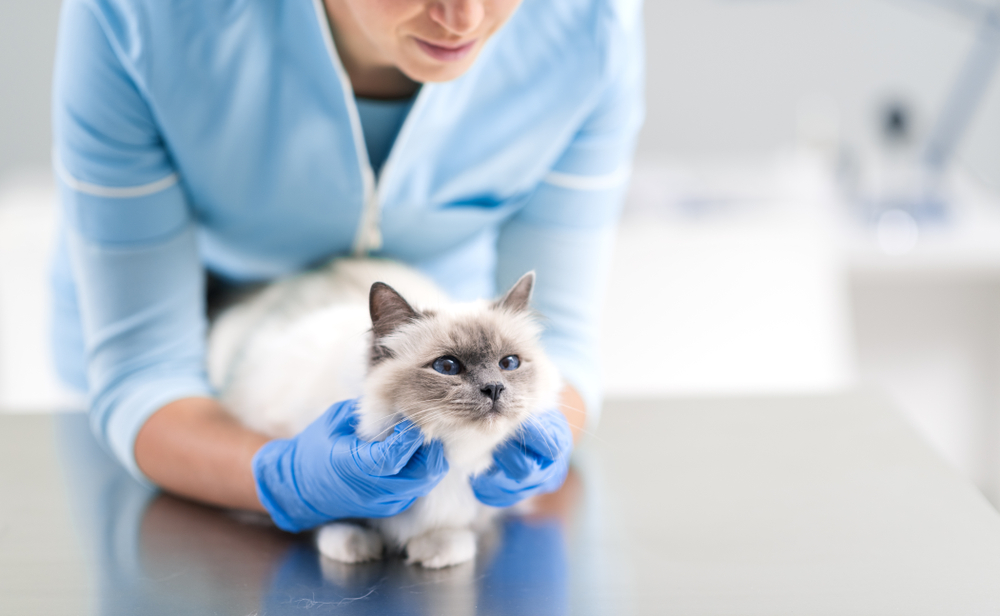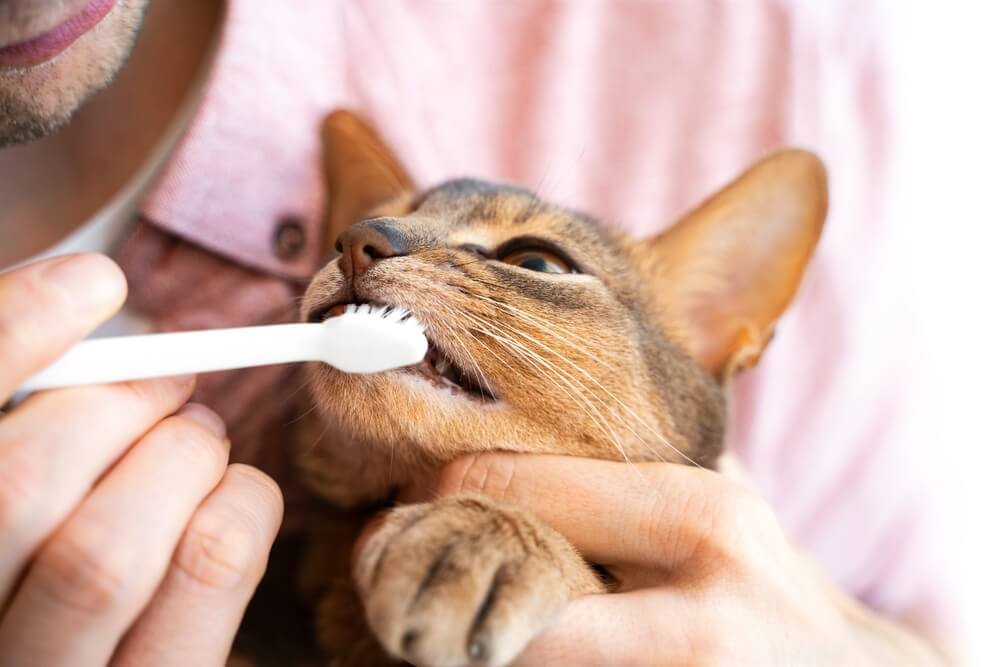
Cats, like humans, can suffer from a wide range of cancers that show signs and symptoms in different ways, so knowing what to look out for is an important part of being a responsible pet parent.
Also like humans, we don’t know how all types of cancer begin and develop in cats, but some cats are more at risk from certain types of cancer than others — for example, white cats are at a higher risk of skin cancer from sunlight.
To help you tell if your cat has cancer and how to help them, it’s worth being aware of the signs of cancer, even if your cat is young. As with any illness, the earlier it’s picked up and diagnosed, the more successful treatment could potentially be.
What are the signs of cancer in cats?
Some of the more common signs that your cat may have cancer include:
- Sudden weight loss
- Sores that don’t heal
- Vomiting and diarrhea
- Severe lethargy
- New lumps under or on the skin
- Restlessness, or withdrawing to be on their own
- Difficulty eating
- Lameness or difficulty moving
Many of these symptoms are associated with other illnesses, so although you may be concerned if you notice your cat is acting unusually or has a strange growth on their skin, it may not be cancer and your cat may be feeling unwell for other reasons.
As always, if you’re worried that your cat might have cancer, you should take them to the veterinary surgeon for a full examination, tests, and advice from experts.
What are the most common types of cancer in cats?
Lymphoma — this is the most common type of cancer in cats, it affects the white blood cells (lymphocytes). Because they circulate around the cat’s body in the blood stream, and pass through the lymph nodes which screen for infection, they can rapidly spread cancer to other internal organs, in particular the intestines, spleen, and liver. Typically, lymphoma occurs in cats older than 10 years of age.
Skin tumors — these are known as basal cell tumors, and are common in cats. They are usually benign (non-cancerous), although they can be malignant (cancerous). They can often be removed via a simple operation.
Mammary tumors — cancer may occur in one or more of a female cat’s eight mammaries. Usually, if a tumor (also known as a growth) is picked up, all the breast tissue on that side of the body is removed in an effort to stop the spread of the cancerous cells. Despite these efforts, though, sometimes the cancer may have already spread internally to the organs despite removing the mammary tissue.
Soft tissue sarcomas — this type of cancer begins growing from the cells that support the skin, muscle, fat, or nerves, and grows as a firm lump under the skin.
Squamous cell carcinoma — is a skin cancer usually caused by sunlight. It can often be found on the skin or ears, or in the mouth.
Bone cancer — a rarer type of cancer found in cats, it’s usually aggressive and spreads quickly. Symptoms include lameness, pain when moving, swelling, and lethargy.
Mast cell tumors — mast cells are white blood cells, and if they become cancerous they cause tumors to develop, usually on a cat’s skin, or sometimes in the spleen or intestines. These tumors can be benign or malignant. Most cats with cutaneous (lumps on or in the skin) mast cell tumors continue to live healthy lives. Siamese cats are particularly prone to this type of cancer.
What causes cancer in cats?
Like with humans, the cause of certain cancers cannot be pinpointed. It’s often a combination of genes and environment. Smoke has been linked to lymphoma — for example, cats living in homes where there are cigarette smokers are twice as likely to be diagnosed with lymphoma.
Skin cancer also has a link to sunlight exposure, and a lack of exercise can result in some cats developing cancer.
What do you do if you think your cat has cancer?
The first thing to do is take your cat to the vet. Your veterinary surgeon will examine them and do relevant tests to diagnose the issue. These will include blood and urine tests, as well as potentially other tests including x-rays, MRI scans, ultrasounds, FNAs (fine-needle aspirations), and biopsies to determine whether or not it’s cancer.
If it is diagnosed as cancer, there are a number of options and treatments available, depending on the stage of the cancer — ie how aggressive it is in terms of the cancerous cells spreading through the cat’s body to other organs.
Can cancer in cats be treated?
There are options if your cat is diagnosed with cancer. It will depend on the type of cancer and severity/stage, and your vet will advise you on your options.
These might include:
Chemotherapy — this involves giving your cat medication to try to stop the spread of the cancerous cells. It usually has no side effects for your cat, as the dose is low, but it also does not usually stop the cancer. Rather, it reduces the symptoms and prolongs your cat’s life.
Radiotherapy — radiotherapy targets tumors and attempts to destroy cancerous cells to stop the tumor growing and the cancer spreading. Like chemotherapy, this does not always cure the cancer. Your cat will also need to undergo a general anesthetic to ensure that they remain still during the procedure.
Surgery — this involves an operation by a veterinary surgeon to remove your cat’s tumor/tumors. Once removed, the tumor is analyzed to determine if it is cancerous, and if it is, exactly what type of cancer it is. Removing a malignant tumor does not always guarantee that the cancer hasn’t already spread elsewhere in the body.
How long will my cat with cancer live?
Unfortunately, there’s no definitive answer to this question. Your vet will be able to give you the best advice on how to care for your cat with cancer, and an idea of how long they might live.
If treatment is successful it may prolong your cat’s life, so that if it’s not an aggressive cancer your cat may live for several more years. If your cat is diagnosed with cancer, there is a range of cat food available designed for cats with cancer.
We uphold the highest editorial standards when creating the authoritative content pet parents rely on and trust.
Every piece of clinical content on the Cat Food Advisor is reviewed by our certified Veterinary Advisory Board, which consists of licensed veterinarians and medically certified specialists.
Our reviews are completely independent; we are not paid by any pet food company to promote their products favorably. We do not accept money, gifts, samples or other incentives in exchange for special consideration. For more information see our Disclaimer & Disclosure page.










